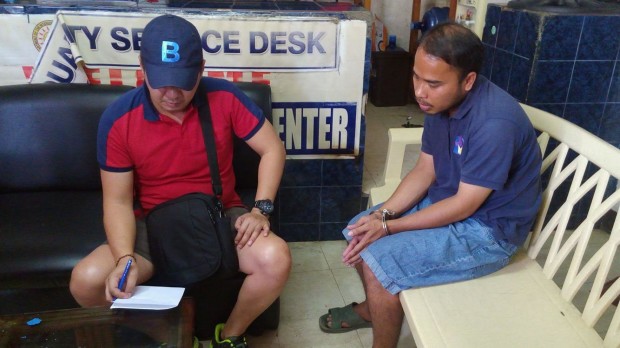
A representative of the Bangko Sentral ng Pilipinas interrogates Junrey Cagay at the Carbon Police Station after the latter’s arrest for manufacturing and selling fake money bills. ADOR VINCENT S. MAYOL/INQUIRER VISAYAS
CEBU CITY—At least P24,000 worth of fake peso bills were seized by Cebu City policemen in a sting operation along Colon Street in downtown Cebu City past noon on Saturday.
Junrey Cagay, 23, and a resident of Barangay (village) Quiot, Cebu City, was arrested after he turned over pieces of fake P1,000, P200, and P100 bills to an undercover policeman who posed as a buyer.
Charges of forgery and illegal possession of bank and treasury notes would be filed against Cagay at the Cebu City Prosecutor’s Office next week.
Cebu City Councilor Dave Tumulak, deputy mayor on police matters, said an in-depth investigation was being conducted to identify Cagay’s cohorts in manufacturing fake money bills.
“Based on our information, the suspect is part of a syndicate which is into proliferating fake money. Let us not allow fake money to enter Cebu City because it will ruin our economy,” he said in an interview.
“I also urged the public to be careful. Let us stop this illegal operation as much as possible,” he added.
Tumulak has been coordinating with the Bangko Sentral ng Pilipinas (BSP) since December 2016 after he received information about the proliferation of fake money in Cebu City.
With the help of the police, he said they were able to track down one of the alleged manufacturers of fake money bills in the city.
Tumulak said it is difficult to determine whether or not the peso bill is genuine, especially if one does not have a technical know-how.
A representative of BSP, who requested anonymity, said the public should take note of the distinguishing features of genuine money bills especially the embossed print which cannot be replicated.
“Feel the surface of the bill. If it’s rough, that’s genuine. If it’s very smooth, then that’s fake,” she said.
Other security features in the NGC banknotes include visible and embedded security fibers, an ascending serial number, and watermarks, she said.
When the banknotes are viewed against the light, the BSP representative said concealed value of the note and the see-through mark of the word “Pilipino” written in Baybayin, and the face of the person featured on the bill can also be seen.
In an interview at the Carbon Police Station, Cagay admitted having manufactured fake money.
He said he started engaging in the illegal business a month ago.
“I would have wanted to stop manufacturing fake bills but the demand was high from my customers,” said Cagay who also works as a masseur.
Cagay said he sells each fake money bill at P20.
He said no one taught him how to make fake bills.
“I taught myself. I made the fake bills using a computer,” he said. “Now, I regret I got into this business.”